Teresa believes in training for the future: her initiatives are distinctive for organically integrating sustainable action, what we might call “empowered repeatability”: from faculty engagement groups to intensive training workshops for graduate students, she makes it possible for the wisdom she shares and summons up together with others to spread out in ripples and waves, from person to person and group to group.
—Joy Connolly, President, American Council of Learned Societies

In 2010, Professor Teresa Mangum picked up a paintbrush alongside administrator and compatriot Neda Hatami. The two began transforming the Tudor-style house at 111 Church Street into what is now the University of Iowa’s Obermann Center for Advanced Studies. It wasn’t just a fresh coat of paint. From the start of her fourteen-year tenure as director of the Obermann Center—which falls under the auspices of the Office of the Vice President of Research and is located across from the UI President’s residence—Teresa has been building a legacy.
“My favorite thing is watching how people enter the space,” she remarks, speaking about the Center with a mixture of Midwestern lucidity and Southern warmth. “People walk in and you can see them thinking, This is what I thought it would be like to be at a university. The image of people’s faces when they walk in is one of my guiding lights. How do we keep the hope for an intellectual life alive?”
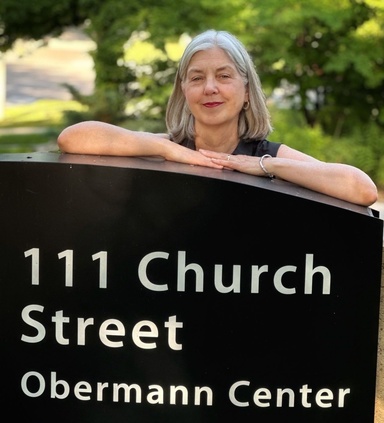
Professor Teresa Mangum makes people laugh, and she makes people think. She has devoted a career not only to publishing inventive scholarship, directing flagship academic organizations, and founding transformative book series, but also to making the most marvelous things possible for a great number of humans at and through the university. Outstretched arms and a flourished paintbrush (above left) capture this spirit of possibility-in-motion. A smile in the summer of 2023 with arms folded over the Center’s new sign (right) evokes the scope of all she has accomplished during her directorship, in coordination with gifted staff, campus and community partners, university leadership, and fellow trailblazers in research leadership across the globe. “The Center is held up as a guidepost for other centers across the country,” says Kristy Nabhan-Warren, Elizabeth Kahl-Figge Chair in Catholic Studies and Associate Vice President for Research. It isn’t hard to imagine C. Esco and Avalon Obermann, who endowed Iowa’s Center for Advanced Studies in 1978, smiling back at Professor Mangum helping to materialize their vision of curiosity and generative interdisciplinary exploration.
As two people fortunate to work with Teresa for nearly two decades, we are delighted to join others in celebrating her and her career on the occasion of her retirement and the Obermann Center’s 45th anniversary celebration on May 6th. We know we're not alone in wishing that we could somehow reciprocate the many gifts she has bestowed on us and our campus, departments, and fields. (For me, Rachel, these fields include public engagement and gender studies. For me, Naomi, they include the interdisciplinary humanities, literature, and gender studies.) More than an expression of our respective gratitude, though, we have co-authored this article as a testament to Professor Mangum’s unusually inspiring and expansive work and her impact on people’s lives.
Teresa has exceeded many of the benchmarks of a distinguished career, even as she has challenged academia’s entrenched and exclusionary prestige economy. We admire the ways she has asked academic institutions to live up to their promises, and worked to construct a more just, supportive, and genuinely intellectual university when they come up short. From her broadening of Victorianist and nineteenth-century studies as vantages from which to re-imagine the present and future; to her impactful, award-winning teaching; to her research leadership that has sharpened the work of centers, institutes, and universities globally—the University of Iowa and the profession writ large would be hollow, drab, and far less life-giving without her.
Ingredients: Secret Sauce and a Sense of Possibility
Hunger, authoritarianism, racism, climate crisis—we are at a point where we need all hands on deck, and we especially need people whose lives are dedicated to ideas and experimentation on deck. People in the humanities can underestimate what a crucial role they play in those endeavors: we are immensely talented storytellers and meaning makers. We don’t need to be the icing on anybody’s cake. We can be, and in the best cases already are, part of the recipe—baked right in from the beginning.
—Teresa Mangum
Teresa first came to the University of Iowa in August of 1990. We asked what initially brought her to campus and how she understood the recipe guiding her career. At the time, she was a visiting professor at Marquette University, which had just offered her a tenure-track position. She chose to join the faculty at Iowa. “I’m intellectually promiscuous,” she explains.
It was so great to see what a challenging place that was really collaborative and creative and supportive would look like. It was clear that, at Iowa, if you had good ideas, you could receive support to experiment and try things.
One of the places where Teresa found such support was the University of Iowa Center for Advanced Studies (it wouldn’t be christened "The C. Esco and Avalon L. Obermann Center for Advanced Studies" until its endowment in 1993). Then-director Jay Semel’s guiding of collective exploration out on Oakdale Boulevard helped shape Teresa’s scholarship and her research leadership.
It was at Obermann that Professor Mangum co-facilitated a dynamic Animal Studies group in the early 2000s with American Studies Professor Jane Desmond, growing this nascent field through her scholarship on the complex relations between humans and other animals. Teresa also forged interdisciplinary collaborations between health scientists and humanists to explore how cultural narrative actively shapes aging. Before these interdisciplinary ventures, Mangum’s earlier articles and monograph, Married, Middle-brow, and Militant: Sarah Grand and the New Woman Novel, powerfully traced the “inevitable contradictions between human belief and desire embedded in marriage” (9). Teresa demonstrated that the candid, de-idealized treatment of marriage in the “new woman novel” spurred imaginative restructuring of the church, law, politics, medicine, education, and readers’ outlooks on a life well-lived. Mangum didn’t stop at publishing articles or editing journals about these developments, however—she brought her research to life through teaching and partnerships with others, working to transform social and cultural institutions herself.
One of Teresa’s hallmarks is developing research based, engaged and engaging programs, events, exhibits, and initiatives. As Joy Connolly, President of the American Council of Learned Societies and former provost of The Graduate Center of the City University of New York, powerfully puts it, Professor Mangum builds “sustainable infrastructure” that is “open to the free play of imagination and creativity and the sheer pleasures of learning and thinking—the opposite of …dreary bureaucratese.” Early versions of such collaborations notably included “Animal Expressions,” an art menagerie at the Stanley Museum of Art. Teresa, Jane Desmond, and the members of their Obermann seminar (Kim Marra, Mary Trachsel, Pamela White Trimpe, and Ed Wasserman) yoked the exhibit to a lively animal photography competition for K–12 students organized in collaboration with the Pentacrest Museums and the Iowa Children’s Museum. Teresa also organized staged readings, such as the revival of Elizabeth Robins’s suffrage play, Votes for Women! at its centennial during the 2008 U.S. presidential election. These kind of events strengthen and expand the university’s research infrastructure.
But how, exactly, does Mangum allow the “wisdom she shares and summons up together with others to spread out in ripples and waves, from person to person and group to group,” as Joy Connolly describes? Having seen Teresa in action, Connolly breaks it down:
Teresa Mangum is a creative thinker and a hard-working doer, a pragmatic advocate with an inspiring vision. She lives the truth that to get anything done in academia that has lasting impact and is sustainable over time, one must work with others from the very start, invite critique, be curious, change course when a better idea emerges, celebrate everyone’s contributions—and be prepared to get up and do it all again.
Kristy Nabhan-Warren adds her appreciation for the “the intentional care she has shown in mentoring emerging and established scholars alike,” care that moves these ripples equitably. In short, in concert with others, Teresa “organically integrates sustainable action,” as Connolly puts it.
Professor Mangum’s career has been impressive and impressively multifaceted. Her wide and deep contributions to academic life have garnered her the May Brodbeck Distinguished Achievement Award, the UI President and Provost Award for Teaching Excellence, and the UI Brody Award for Service to the University and State of Iowa. Among other achievements, in 2010 she received the British Women Writers Association Biennial Award for Contributions to the Study of British Women Writers. In 2017, she was inducted into the Academy of Community Engagement Scholarship. From 2018 to 2022, Mangum held the Vice Presidency of the National Humanities Alliance Board of Directors (NHA), and was president of the Interdisciplinary Nineteenth-Century Studies Association (INCS). Teresa has shared her knowledge of organizational structure and public engagement research and practice as an external consultant, helping to develop countless centers, programs, and departments, including through the American Council of Learned Societies, the Mellon Foundation, and the Federation of State Humanities Councils. Professor Mangum also served as chair of the delegate assembly organizing committee of the Modern Language Association (MLA). This position is widely known to require wisdom, judicious direction, and at times the patience of Job.
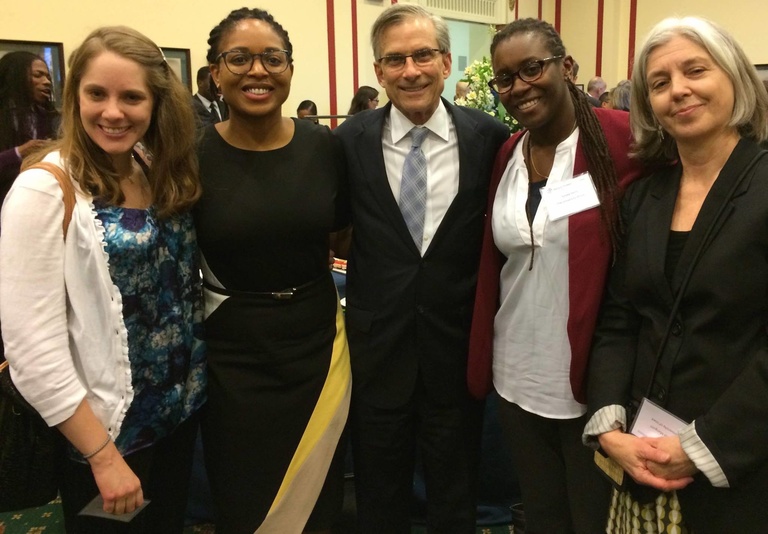
In addition to all of this, Teresa has traveled to Capitol Hill each spring for many years to participate in NHA’s Humanities Advocacy Day, where she and UI humanities graduate students meet with members of Congress and their staff to make the case for increased federal funding for humanities research, teaching, preservation, and programming.
It was during her fellowship at the Center for 20th-Century Studies (now 21st-Century Studies) at the University of Wisconsin, Milwaukee that Teresa began to more tightly link her scholarship with research leadership. There, she met Kathleen Woodward, now Lockwood Professor and Director of the Simpson Center for Humanities at Washington University. Kathleen, she says, "is the person who, when you’re in a group and things start to shut down, she spins and with just a little nudge and creative way of engaging, moves people out of that rut and gets them thinking forward again.”
It was interesting for us to hear Teresa describe what she admires in others using words that readily evoked how she herself inhabits academe. Erin Hackathorn, the Obermann Center’s director of operations, expresses that she’s “learned so much from Teresa. She truly cares about her colleagues and goes out of her way to support us professionally and personally." Communications specialist Jenna Hammerich affirms that “Teresa’s a brilliant listener; I always feel heard, understood, and valued at work. In sorting through Obermann’s photo archive, I’ve discovered hundreds of photos of Teresa intently listening to colleagues and students—head slightly tilted, eyes trained on the speaker. It’s a magical quality.”
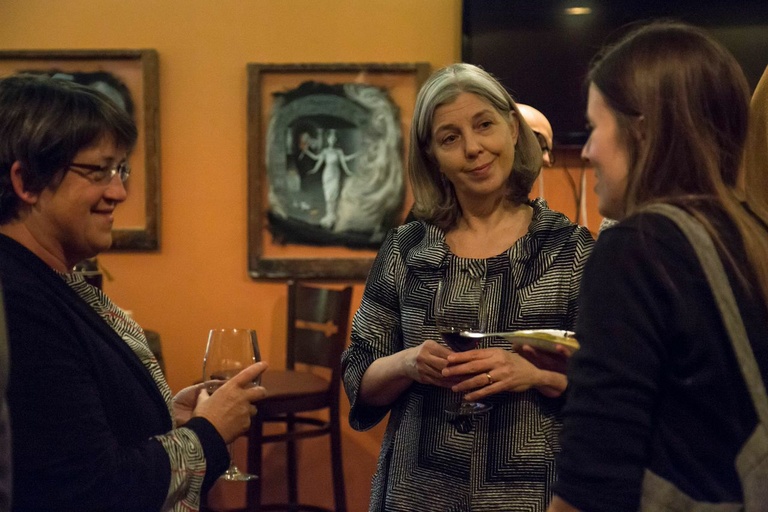
In addition to deep listening and a vivacious spirit, Teresa is known for her gift of speaking the truth firmly enough that it penetrates at intense moments, and gently enough that it lands, orienting a group toward next steps. Professor Mangum is also known for “seeing the potential for what a group of people can do together if you can find a common purpose,” a comment Teresa made about those she admires that mirrors what others expressed about her. Assistant director of the Obermann Center Dr. Lauren Burrell Cox, for example, who arrived in Iowa well-steeped in lessons about research centers, remarks, “Although I’ve only worked with Teresa for a little over a year, she’s reshaped my thinking about what is possible when it comes to collaborative and interdisciplinary work in higher education.”
The chance to speak with Teresa and others about her career made us reflect on the intentional exchange of knowledge, wisdom, and skills across generations. We could see Teresa’s influential place in a constellation of people sharing and re-interpreting acts of convening and governance, working to build not only knowledge infrastructure, but also a world of greater possibility.
Shake & Stir: Interdisciplinary, Engaged Collaboration
Teresa Mangum has made an indelible mark on the humanities during her illustrious career. She is well-known and highly regarded for her innovative scholarship, extraordinary creativity, executive competence, and unparalleled generosity.
—Mona Frederick, former executive director of Vanderbilt University’s Robert Penn Warren Center for the Humanities
“The purpose of Obermann is to serve and support researchers, scholars, and creators. It's crucial to gather people and make space for conversations and exploration through conversations,” Professor Mangum explains. “That’s hard to document, that spirit of openness, reminding UI artists, scholars, and researchers that this is your place, your center.”
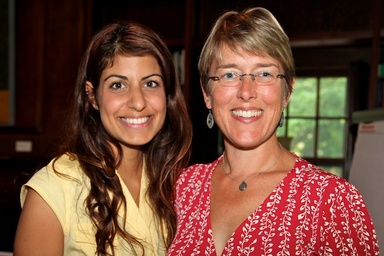
Anyone who has participated in any of its activities, events, or programming would plus-one Teresa’s statement that “Obermann is what it is because of the amazing staff we have, including Jennifer New,” associate director of the center from 2012–22, and a public scholar, writer, and force for good in her own right. “Their creativity, dedication, and belief in the mission of the center, and the way that they reach out to their peers across campus— that's the real heart and soul.” Always Obermann’s advocate, including on the eve of retirement, Professor Mangum can’t resist adding with an arched eyebrow, “Now, our recipe could serve a lot more people if we had more staff, more funding. It is amazing, though, what the center can do."
Reflecting on his role on the committee that hired Teresa, longtime collaborator Ken Brown, UI Tippie Children Professor of Management and Entrepreneurship, notes, “For those who’ve arrived since Teresa was established as…director, it may be hard to imagine the uncertainty that existed back then. Jay Semel had retired after many years of service, and the home base for Obermann had been bulldozed.” Professor Mangum has observed herself that one sign of a center’s success is when its good work becomes so well-established that it is naturalized into the landscape of a place, as if it somehow always existed. Our own scholarship on distributions of labor has taught us that when people and their work begin to seem like institutions, it becomes ethically important to ensure that their labor and expertise are visible. To this point, Ken adds,
Looking back, I can see the incredible care that Teresa took in preparing the new facility on Church Street, sunsetting and launching new programs, and cultivating a campus-wide network. …That network now reaches far beyond the walls of the university, deep into the local community, across the country, and into national funding agencies like the Mellon Foundation.
Professor Mangum has been the P.I. for $4 million in grants during her time at the University of Iowa, much of it through external grants in areas where the funding landscape is small in scale in comparison to the sciences. This number is one important measure of the immense investment in the research culture and life of the University of Iowa that Teresa has helped steward. Most recently, in collaboration with the College of Liberal Arts & Sciences and the Graduate College, she helped make the University of Iowa and the Obermann Center international beacons for public engagement through the Humanities for the Public Good (HPG) initiative.
As the primary investigator of this Mellon Foundation–funded initiative, Teresa worked to make the “methods, materials, and mindsets of the humanities, combined with practical skills and values-driven purpose” a basis for a diversity of richly meaningful careers for UI graduate students. Based in Mangum’s scholarship on engagement as well as the Humanities and Public Life book series she and public history professor Anne Valk (CUNY Graduate Center) co-edit for the University of Iowa Press, HPG enhances the impact of the humanities at the same time that it builds a future for humanistic inquiry on campus. This initiative has roots going back at least 20 years to the Graduate Institute on Engagement and the Academy that Teresa, former political science professor David Redlawsk, and Jennifer New co-created and -directed.
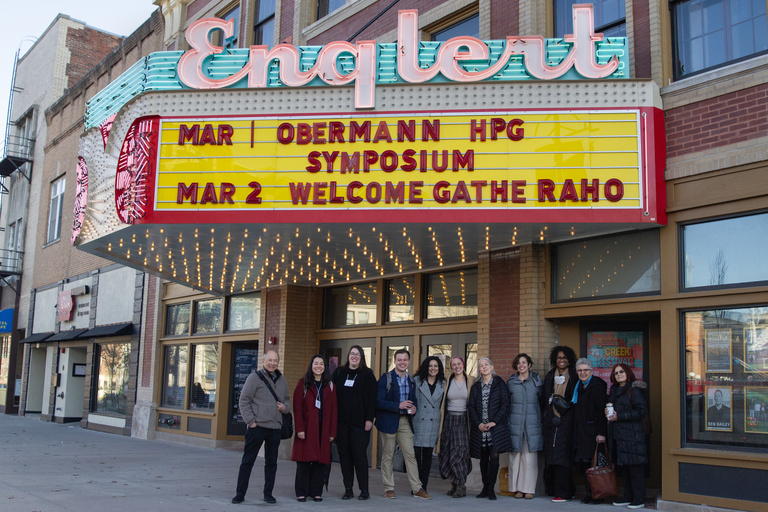
The public and applied humanities have been growing for decades. Humanists create and interpret diverse cultures and traditions, reflecting on the shifting human condition. The applied humanities push the field a step further by asking participants to connect ideas and actions with the public good. Over the years, Ken Brown, Nick Benson, fellow UI administrators, faculty, staff, students, and collaborators in many local organizations, communities, and nonprofits worked to forge ethical and reciprocal partnerships with this aim in mind. Today, the Office of Community Engagement (OCE) at the University is devoted to “impacting Iowa communities and beyond through community-engaged teaching, learning, and research.” The OCE’s exciting Graduate Engagement Corps is a powerful example of good work seeded at Obermann and vigorously grown from an early collaboration into sustainable infrastructure in an excellent home on campus.
Teresa’s own renowned expertise in engaged scholarship and teaching has roots—or perhaps we should say legs—in her Victorian animal literatures course, which was awarded the Humane Society Animal and Society Course Award for Innovation in 2005. Teresa took students in this class to the Iowa City Animal Care and Adoption Center. Each week, the students spent time there helping to walk dogs, learning to listen for animal stories, and writing extensive journal entries about the animals they cared for. Back on campus, they read animal fiction and research in literary and animal studies. For their final project, they crafted fanciful first-person narratives that lent each animal a vivid voice and personality. The animal center used these stories to appeal to potential adopters, who, of course, were enchanted.
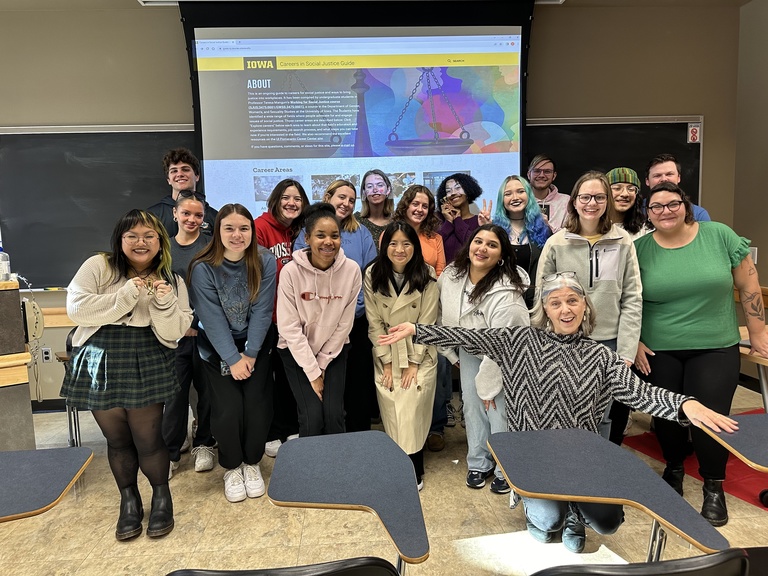
For about a decade, Teresa has held joint appointments in the Department of English and the Department of Gender, Women’s and Sexuality Studies (GWSS). As a leader in GWSS, she has mentored junior faculty members as well as those at her own rank, helped broaden the department’s focus, raised enrollments, and strengthened the unit’s mission. She also offered cutting-edge classes that shaped the lives of students, such as her Working for Social Justice course. Some might find it tempting to conclude that Teresa dwells largely in the domain of so-called “soft skills” (re-termed smart skills to combat gender bias around their enormous value). While Professor Mangum certainly does excel at convening, facilitating, navigating, connecting, supporting, amplifying, and more, she is also a keen visionary, an uncompromising leader, a trenchant interpreter of text and context, and an exceptionally astute observer who makes connections others miss.
That Teresa brings people together in authentic ways in today’s world of budget cuts, barriers, and binarization is no small feat. Friend and colleague Mona Frederick (former executive director of Vanderbilt University’s Robert Penn Warren Center for the Humanities) remarks,
I do not believe that there is any organization Teresa has been part of in which she has not at some point been asked to serve in a leadership capacity. I witnessed her leadership skills in a variety of national organizations in which I was also a member: the Advisory Boards of the Consortium of Humanities Centers and Institutes; Imagining America: Artists and Scholars in Public Life; and the National Humanities Alliance. At the annual meetings of these groups, everyone always sought out Teresa for her advice and guidance.
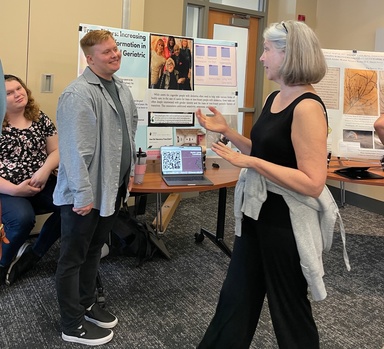
Antoinette Burton, Swanlund Endowed Chair of History and director of the Humanities Research Institute at the University of Illinois Urbana-Champaign, offers her own account of Mangum’s “curious and lively” way of moving through academe: “Generous, imaginative, unbridled by discipline or impediment, she opens up new ways of thinking and seeing whenever she’s in a conversation.” Antoinette adds, “She’s quite serious but also charmingly kooky in ways you rarely see in academia. In short, she’s refreshing. But she also knows how to pay attention.” These testimonials help illustrate Teresa Mangum’s impact as not only a scholar, but also a public servant, leader, teacher, friend, and exemplary collaborator.
Dream Big, Act Small, and Enjoy
Teresa has been gently fierce, scholarly yet practical, and a source of ongoing inspiration to many. She has modeled courage and in so doing, led others to take risks to do the work that means the most to them. I’m no expert on English literature, so I risk her disappointment at this parallel, but in my mind she is our wise Lizzy Bennet, but with a gentle southern drawl.
—Ken Brown, Tippie Children Professor of Management and Entrepreneurship, University of Iowa
The first time I (Rachel) met Teresa Mangum, I was a junior faculty member in a committee meeting. She had a beautiful swath of silver hair that circled her head and framed her face. She had a lilting North Carolina accent that was far more pleasing than my own, and she really listened when other people talked. Fascinated and enamored, I watched her wrangle a room full of faculty to reach a consensus, which as we know is…challenging. When the meeting ended, people were smiling and lingered before walking out together. Teresa is masterful when it comes to bringing people together to dream big but also to slow down, engage in rich conversation, and recall exactly the life-changing importance of such moments of mutuality.
Ann Ricketts, former Associate Vice President in the UI Office of the Vice President for Research, has enjoyed working with Teresa over the years. She remarks on this talent of bringing people together:
Teresa Mangum is a bridge builder, boundary spanner, champion of the disadvantaged, and a real wall buster. I am personally grateful for Teresa’s willingness to pierce the faculty-staff barrier. My staff colleagues and I—Kristi Fitzpatrick, Mary Blackwood, and Ann Knudson to name a few—reveled in our work with the Obermann Center. …We understood that when we took our seats in the Obermann library, we belonged at the table and were invited to fully participate in the intellectual life of the University of Iowa.
Teresa has, in short, been a model for leadership, vision, character, integrity, and respectful connection since she stepped foot on campus in 1990. We asked her what she plans to do once she steps away from the university, and she animatedly shared not just ideas, but a strategy:
I have approached retiring just like any other research project. So! I assembled and invited a group of women who retired in the last few years for a drink. I thought they’d, you know, give me a little advice. We were at Brix for three hours. Ethnography! Amazing conversation. Traveling, writing, volunteering—they were finding so much meaning in life reinterpreting all that they were passionate about as scholars as PRACTICE out in the world. It gave me such a vision of the joy of the work I’ve been able to do and the joy of reimagining it through the lens of a new, more open life. I’m going to have the best of both worlds.
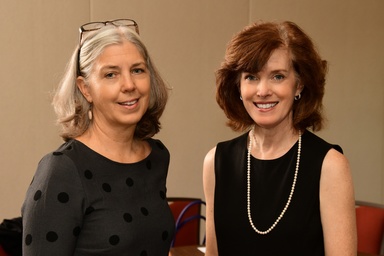
Always the teacher, she instructs both of us, “You don’t have to plan retirement alone! Remember your skills as a researcher!” We promised we would.
A last inspiring connection is Teresa’s long and loving partnership with UI Cinematic Arts professor Corey Creekmur. The two met in graduate school, when Teresa was failing miserably to edit a film for a class. She was despairing over the bits and pieces of celluloid all over the floor. Always the generous and gentle soul, Corey came to her aid, and they have been making amazing things happen since the day they filled a small dark room with laughter, scotch tape, and art.
Teresa’s new adventures will include spending lots of cozy evenings with Corey and their feisty felines, reading good books, adventuring to various exciting locations, hanging out with friends and family, visiting the Jane Goodall Institute, and making a pilgrimage to visit an elephant at the Sheldrick Wildlife Trust in Kenya that Obermann staff (Erin Hackathorn, Jennifer New, and Jenna Hammerich) adopted for her birthday.
We look forward to celebrating Teresa’s legacy at the 45th anniversary celebration that the Office of the Vice President for Research is hosting for the Iowa’s Center for Advanced Studies—and wish her so much joy in her next chapter! In Small as an Elephant, a novel about reconnection, Jennifer Richard Jacobson writes, “Elephants love reunions. They recognize one another after years and years of separation and greet each other with wild, boisterous joy.” We have seen videos of elephants remembering humans and each other, lumbering closer with a gracefully awkward sort of jubilation. We only hope that Teresa will never forget us or the University of Iowa and that, every once in a while, we might enjoy a brief reunion.
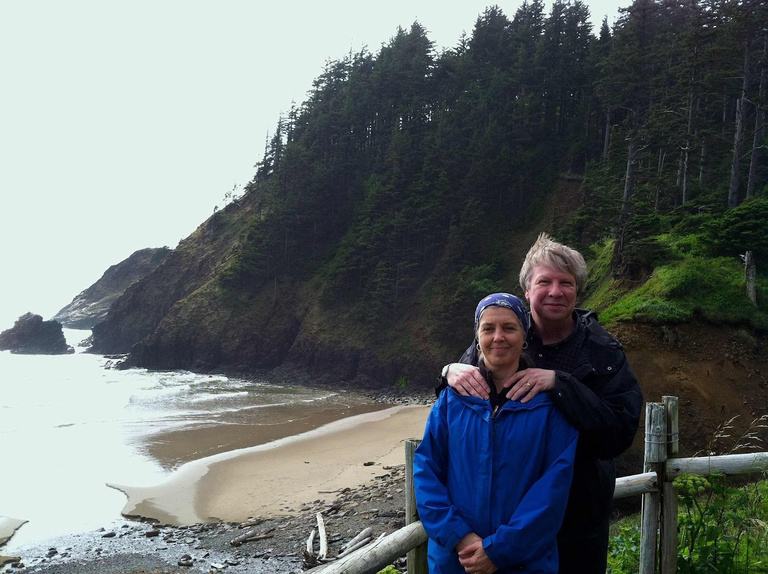
About the authors:
Naomi Greyser serves as executive director of POROI, Iowa’s Project on Rhetoric of Inquiry. In her research, teaching and service, Greyser engages the process of knowledge creation, with an eye towards making space for messiness and unpredictability. Her first book, On Sympathetic Grounds: Race, Gender, and Affective Geographies in Nineteenth-Century North America, was published with Oxford University press in 2017. Her articles appear in journals across the humanities, including American Quarterly, Feminist Studies, American Literature, and MELUS: Multiethnic Literatures in the US. Through her scholarship, Greyser brings the literary-rhetorical arts to bear on conversations in university studies, the geo-humanities, American studies, intersectional gender studies, and history of the senses. With the support of grants from the Harvard-Radcliffe Institute and the UI Provost Office, Greyser is currently completing the first of two interlinked book projects: Un/Blocked: Writing, Research, and the Creative Process and Blocked: Writing, Race and Gender at the University. She is a fellow with the Mellon Foundation’s HuMetrics Initiative.
Rachel Williams is Dean of Division of Liberal Arts at the University of North Carolina's School of the Arts. An artist, teacher, and advocate who has experience in visual arts, feminist theory, women’s issues and community engagement, she came to UNCSA after more than two decades at the University of Iowa, where she was professor and department chair of Gender, Women’s and Sexuality Studies and Studio Art. An area of focus in Williams’ scholarly research has been women in prison, and she has worked with incarcerated women as an artist, scholar and teacher since 1994. American alternative/single creator comics and graphic novels have been a focus of her creative scholarship. She was part of a team that received a grant from the Andrew W. Mellon Foundation for the Mellon Sawyer Seminar Racial Reckoning and Social Justice Through Comics in 2022-23, via the Obermann Center for Advanced Studies.